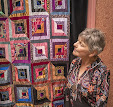Vol.I The Unknown Matisse/ Vol II Matisse. The Master.
Matisse. The Master,Volume II, describes his life once he became recognised. It is significant that the book is dedicated to Matisse's wife, Amélie, whose own life would make a fascinating study for its own sake. She was his mainstay and helpmeet through the early years of struggle and poverty; once he became famous, and affluent, her role was taken over by others and she went into the sort of 'decline' in which she was constantly ill with unspecified problems - very reminiscent of what happened to, say, Alice James, the sister of the more famous Henry and William. It was not an uncommon fate for gifted and intelligent women in the C19 who could find way to break outof the stereotypical view of their roles in life as wives, mothers or, as often was the case, spinsterhood which trapped them in the parental home as carers.


No comments:
Post a Comment